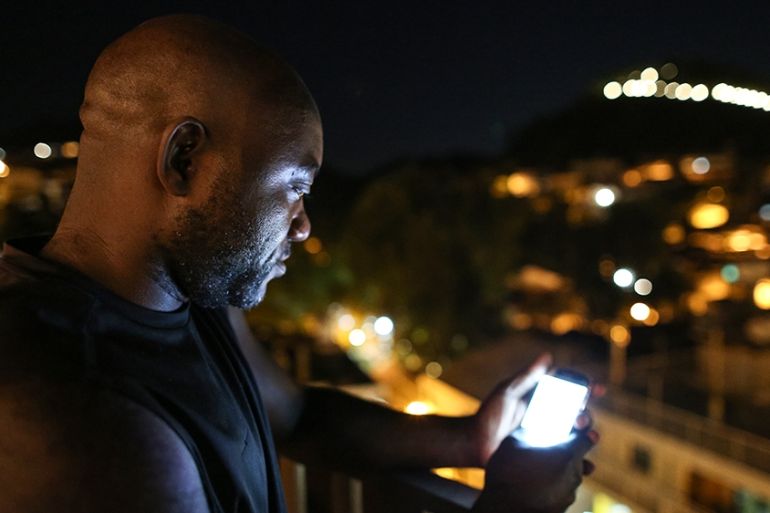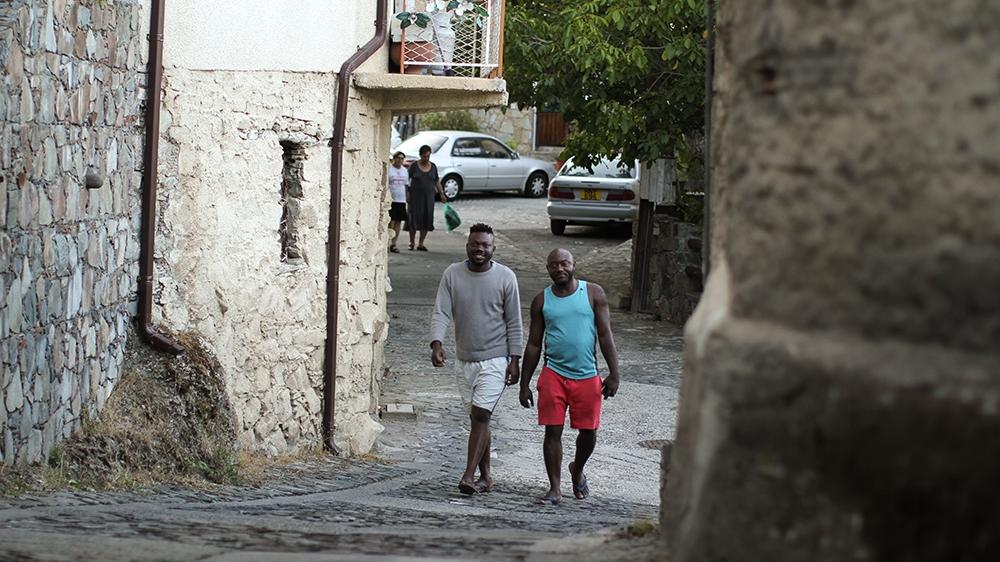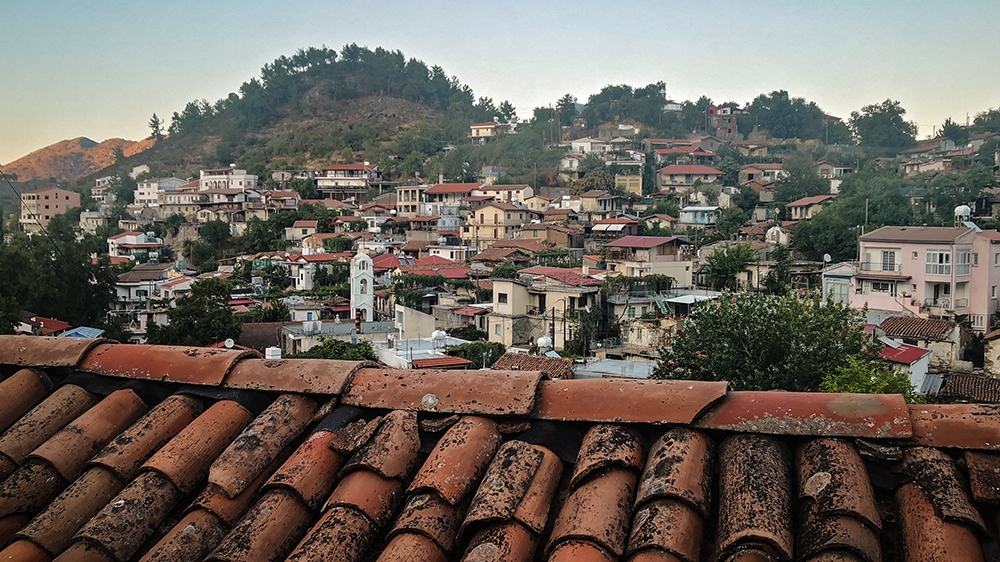African refugees abandon busy Cypriot cities for sleepy villages
Faced with housing and benefits shortages, asylum seekers are migrating to villages, stirring debate among locals.

Palaichori, Cyprus – With the arrival of the evening bus from Nicosia, the central square of Palaichori – a village nestled in a valley of Cyprus’s Troodos mountains – briefly becomes a centre of activity.
At surrounding coffee shops, customers turn to watch the traffic back up as bus passengers spill into the street.
Keep reading
list of 4 itemsUK police arrest three over deaths of five people in English Channel
UK passes bill to deport asylum seekers to Rwanda: What’s next?
‘Can’t give them jobs’: Rwandans grapple with fears over UK asylum plan
In a place where a passing car stirs locals’ curiosity, the loud conversations over the noise of the bus’s engine have shattered the staid atmosphere of the square.
Most of the dialogue is incomprehensible to the observers – greetings and farewells are conducted in various African Pidgin dialects.
The crowd disperses and the bus continues on its journey. Stillness resumes its usual place in the square.
Due to affordable rental prices, Palaichori, like many nearby villages, has become home to increasing numbers of African asylum seekers who are escaping homelessness in the expensive cities of Cyprus.
Over the past year, the Mediterranean island nation has become the highest per-capita recipient of asylum seekers entering the European Union.
According to Eurostat, from January to July of this year, 7,812 new applications for asylum were made in Cyprus, a country with a population of 850,000.

Faced with a shortage of housing and social welfare, asylum seekers are finding their own solutions while waiting for their claims to be processed.
“I was homeless and sleeping in a church in Nicosia but there were too many people there and it wasn’t healthy,” says Fidelis, a Cameroonian who fled his country’s civil war two months ago.
“Somebody told me there might be cheap housing in this village so I came on the bus one day to look. I didn’t know anybody here but luckily I met someone from Cameroon and they helped me find a place.”
The rural villages in the mountains of the island’s interior offer an idyllic image of life.
Communities are tight-knit, people know their neighbours.
Natural environmental barriers have afforded them protection over the centuries and they remain bastions of Cypriot culture and dialect. However, this sense of isolation also results in some people viewing outsiders with distrust.
Despite the challenges, Fidelis, who says he fled Cameroon after the military killed his parents, claims to be happy to have found a country where he can live safely.
“Some people when they see you, they look at you like a stranger,” he says. “But at least when I compare the situation back home, things are better here because I have safety and peace of mind.”
He gestures to the sparse furnishings in the apartment he shares with five other people.
“There are good people here also. Everything we have in the house was given by locals,” he says.

Palaichori Mayor Theophilos Miltiadis said the village of 500 people is now home to between 40 and 50 asylum seekers.
Their arrival has caused division among locals.
“Some people are happy to have them here and we consider them very peaceful, but there is racism also and some don’t want them,” he tells Al Jazeera. “Some avoid them and tell their children not to approach. Often it’s some of the older people who are suspicious.”
Miltiadis said the asylum seekers’ arrival came without any notification or assistance from Cypriot authorities and that some small houses are hosting up to 12 people.
Some of the more welcoming residents have taken it upon themselves to help find accommodation and work for the asylum seekers.
“One morning we just found a group of people wandering around asking if there were houses for rent, so we helped to find some accommodation,” Miltiadis says.
“I spoke with the departments of social welfare and immigration about what will happen but they told me the government is at their limit and they can’t do anything. We asked the people of the village for available jobs and found some.
“They want to work and it’s better than just wandering around the village without a purpose.”
According to NGOs working closely with asylum seekers, the Cypriot government has created a system that exposes already vulnerable people to exploitation and further distress.
Once registered, asylum seekers receive a monthly rental allowance of 100 euros ($110), paid directly to landlords, along with a cheque worth 70 euros ($77) for expenses.
Food coupons worth 180 euros ($198) are also distributed, but can only be redeemed at several stores in Nicosia.
“The plight of asylum seekers in Cyprus is dire,” says Elizabeth Kassini, who leads Caritas Cyprus, a humanitarian group. “After three days in a reception centre, new arrivals are told to leave and find themselves accommodation. More and more people are being pushed into squalor due to the lack of affordable accommodation.”
The benefit payments are considered a temporary means of support until asylum seekers can find employment, however, they are only permitted to work in low-wage jobs in certain sectors of the economy. Many are unable to secure jobs because of language barriers and other practical challenges.
“The situation is creating a whole new category of people who are in a position to be exploited. They are largely precluded from the job market,” says Kassini. “Many people cannot afford housing and by moving to rural villages they become cut off from access to benefits and social workers. Many who try it end up moving back to the city.”
Al Jazeera contacted the Cyprus Asylum Service and the Ministry of Interior for comment but neither offered any response.
Despite the difficulties, Afoh Celestine Tebi, another Cameroonian asylum seeker living in Palaichori, says he prefers village life but after six months in the country he is yet to secure employment.
“I choose to live in the village because it’s calm here and many people are idle in the city. There is trouble there,” he said. “The city is too expensive – there you can find 10 people living in one room. I am tired of eating from coupons. I’m thinking that I would be better to return home and join the fight in my country.”